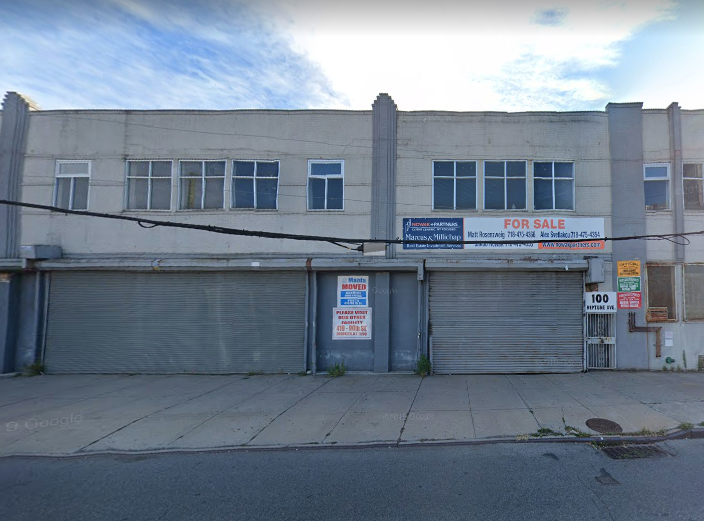City Plans New Shelter in Brighton Beach, But Siting and Management Raise Local Concerns


The city is looking to build a new homeless shelter at 100 Neptune Avenue in Brighton Beach. But some locals have concerns about the nonprofit set to run the facility, as well as potential flooding and contamination issues at the site.
According to the city’s Department of Homeless Services (DHS), the 170-bed shelter for single men will be the first “traditional shelter” within the boundaries of Community Board 13, which, in addition to Brighton Beach, includes the neighborhoods of Seagate, Coney Island, and Gravesend.
“This high-quality facility will be the first traditional shelter in this Community District, offering 170 New Yorkers experiencing homelessness the opportunity to get back on their feet safely and closer to their anchors of life in these unprecedented times,” a DHS spokesperson said in a statement to Bklyner. “Working together with neighbors and not-for-profit service provider CORE, we’re confident that these New Yorkers will be warmly welcomed—and through collaborative support and compassion, we will make this the best experience it can be for all.”
Community Board 13 currently contains one other shelter, a commercial hotel hosting 36 families with children. Mayor Bill de Blasio’s administration has looked to phase out the use of hotels as shelters as part of its Turning the Tide plan to address homelessness.
DHS said the new site would offer priority placement to individuals from the area and would provide support services like counseling, housing placement assistance, health services, and employment support. They also said the shelter operator, CORE Services Group, would oversee 24-hour security and enforce a 10:00 pm curfew for residents, as is often the case at single adult shelters.
But CORE has come under fire in the past for the large number of city violations issued at its 20 existing sites, which are scattered throughout Brooklyn and Queens. In the city’s most recent “shelter repair scorecard,” issued in September, CORE had 174 open violations from the network of agencies that inspect shelter conditions, including the fire, health, buildings, and housing preservation departments.
Last year, that number topped 300, which has raised the concerns of local Council Member Chaim Deutsch.
“I just don’t trust the city when they tend to put in shelters without adequate services, and without taking into consideration the surrounding neighborhoods,” Deutsch said. “So I’ve asked the administration to put a hold on this project until I personally visit every single CORE shelter throughout the city.”
Deutsch, who chairs the City Council’s Committee on Veterans and has previously focused on homelessness within that population, said DHS offered to set up a single site visit. But when he asked the agency for a full list of CORE facilities throughout the city, they told him that social service law prevented them from sharing the addresses of those sites.
“If you speak to people living in the streets, they often have their own concerns about the shelters,” Deutsch said. “And I’m not going to allow the administration to open a shelter in my district where we’re going to see the same problems over and over again.”
CORE did not respond to a request for comment.
A local resident, Craig Hammerman, who previously served as the District Manager for Brooklyn Community Board 6 in Park Slope, also expressed concerns about the site itself. The building currently located at 100 Neptune Avenue, which is owned by Sor-San Realty Corp., was built in 1930 and has served for decades as an auto body repair shop, which means environmental remediation may be necessary for the site to be made suitable for residential use. The area was also flooded during Hurricane Sandy and falls within the Coastal Zone Boundary delineated by the City’s Waterfront Revitalization Program (WRP).
“DHS/CORE must be required to undertake a WRP Consistency review,” Hammerman wrote in an email to elected officials about the project. “And the community deserves to hear the results of such a review prior to the City signing-off on occupancy of the site.”
Hammerman also told Bklyner he believes the proposed shelter’s focus on single men does not adequately address the needs of the area’s homeless population.
“Our neighborhood absolutely needs the best facilities that we can get from the best service providers,” Hammerman said. “What we don’t need is an oversized single men’s shelter, when we have a community of seniors, of veterans, and of families who also need emergency housing.”
DHS did not respond to specific questions about the site’s environmental condition, nor about CORE’s performance. But the agency said increased city inspections had driven down the number of unaddressed shelter violations by more than 93% and that, in the past three years, they had closed nearly 200 shelter sites that did not meet agency standards while simultaneously opening 87 new, higher-quality shelters.
“Homeless New Yorkers come from every community across the five boroughs, and now more than ever, we need every community to come together to address homelessness during this crisis,” the DHS spokesperson said. “As we implement our borough-based approach, we are ending the use of inefficient stop gap facilities citywide while opening the high-quality, borough-based facilities New Yorkers in need deserve as they stabilize their lives.”




